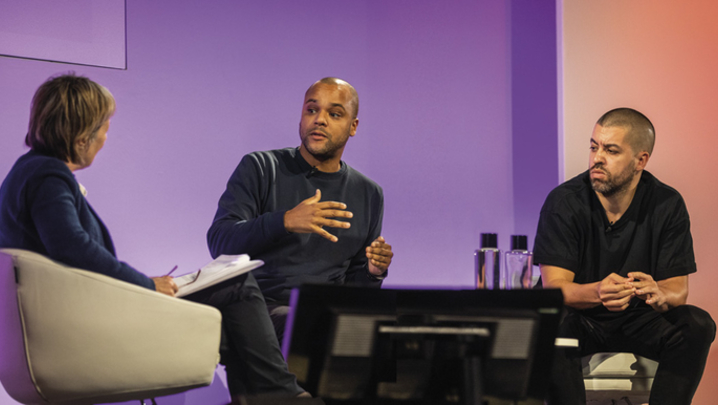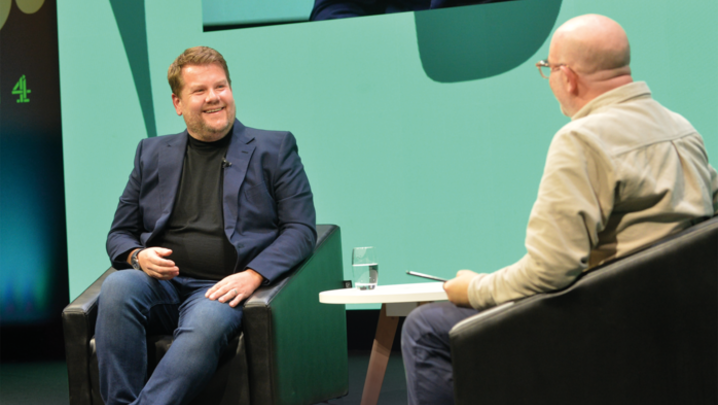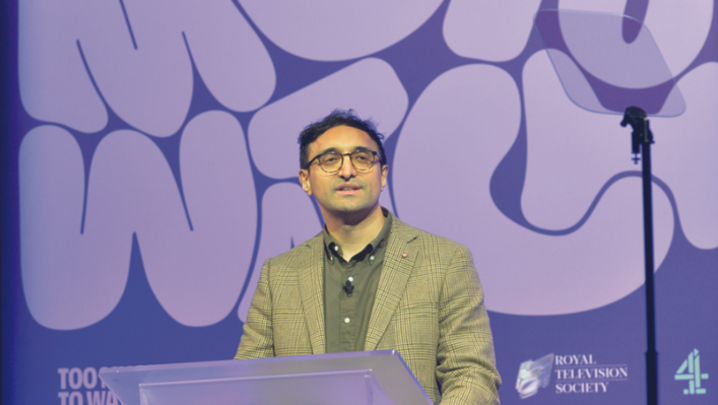Television distils two days of expert advice from leading television practitioners at the RTS Masterclasses 2020.
RTS Craft Skills Masterclasses
The craft masterclasses demonstrated television’s huge variety of creative roles. The cinematography session offered two experts from opposite ends of the shooting spectrum. Georgina Kiedrowski is frequently embedded with the cast on reality shows such as Channel 4’s The Island with Bear Grylls. “I have to concentrate on the editorial as well as [the shooting],” said the self-shooting producer.
Living with the cast 24 hours a day means that she is “forced to experience their discomfort… so I can truly tell the story.”. The Island, Kiedrowski added, was “one of the most difficult jobs I’ve ever done. After six weeks of barely eating, even picking up a Go-Pro becomes difficult.”
Cinematographer Nicola Daley works at cinematography’s glossier end, shooting high-end dramas. After leaving film school, she worked in documentaries and film before landing her first TV drama, series 2 of Netflix’s Australian comedy The Letdown. “It suddenly said Netflix on my CV and that meant, even though my showreel hadn’t changed, [that] more doors opened,” said Daley, who recently shot BBC Two’s Harlots.
Despite their differences, the two cinematographers appreciated each other’s craft. Daley said: “It’s incredible – you’re doing five people’s jobs at once.” Kiedrowski responded: “I could not make it look like you do, Nicola.”
Sound supervisor Kate Hopkins, who has scooped RTS, Bafta and Emmy awards, and Hong Kong-based location sound recordist Mark Roberts specialise in natural history.
For the BBC’s Frozen Planet: On Thin Ice, Roberts made a memorable trip to an ice cap to capture the sounds inside a moulin, a vertical shaft within an ice sheet. A clip at the masterclass showed the recordist “dangling [from a rope] out of shot, mixing and sending audio”.
From the warmth and safety of the post-production studio, Hopkins mixed Roberts’ sounds: “I added a few things but it was lovely to have the real stuff from [location]. It sounded different to normal rivers and waterfalls.”
The editing session brought together factual specialist Rahim Mastafa and drama editor Celia Haining. Initially, Haining worked on horror movies: “It was great fun, doing horror films is so creative – it taught me tons.… They say that comedians are all depressives; well, horror-film people are so sweet and lovely.”
Mastafa moved from editing corporate videos to Doctor Who spin-offs to documentary. Recently, he edited The Real ‘Des’: The Dennis Nilsen Story, a companion doc to ITV’s factual drama Des. “It was a career highlight,” said Mastafa. “There’s lots of elements I had to throw in – the archive, the exclusive content [of Nilsen] and the people who have been interviewed. You have to try to make it fit.”
Drama editors work to a script, but Haining “identified with a lot things that [Rahim] said”. She illustrated her craft with a clip from Netflix drama The Crown.
So, what does it take to be an editor? Patience, reckoned Mastafa, who added: “I’m not precious about the stuff I cut… I’m there to make the [director’s] vision.” Haining agreed: “You can’t be a control freak.”
Russell Dodgson discussed the visual effects (VFX) that his company, Framestore, created for His Dark Materials. The VFX supervisor, who has a craft Bafta for the BBC One drama’s effects, is creative director of television at the VFX and animation studio.
“[VFX] is storytelling,” he said. “There is a huge bank of technology but all technology [does is] make the tools that allow artists to be artists.”
Echoing the theme of the other masterclasses, Dodgson said there was a huge variety of roles in VFX: “Traditionally, you either work in 2D or 3D” – 2D offered roles in rotoscoping and compositing; but, in 3D, VFX specialists “explode out into a million routes… It’s such a vast world.”
Report by Matthew Bell. The RTS Student Craft Skills Masterclasses were held 4-5 November and chaired by Emma Read (cinematography session), Andrew Sheldon (sound) and Helen Scott (editing and VFX).
RTS Student Programme Masterclasses
If you want to forge a career in TV, learn how to be tactful and tenacious. That was one of the main takeaways from four TV RTS Student Programme Masterclasses, in documentary, journalism, drama and daytime/entertainment.
Award-winning documentary-maker George Amponsah recalled how he often worked in the evenings and at weekends. Once, when he was at film school, he collected some camera equipment on Christmas Day.
His films include The Hard Stop, which examined the lives of two friends of Mark Duggan, whose shooting by police sparked riots in the UK in 2011.
He stressed that the start of his career had not been “quick and easy”. When he finally got a break in TV, he won his employers over by bringing enthusiasm to even the most menial of tasks. “I worked for a company called Espresso TV that made the kind of films you’d find tucked away in the DVD shelves at WH Smith, films about Second World War fighter planes,” said Amponsah. “I wasn’t even a runner. Finally, I did my first shoot, when I filmed a Spitfire taking off and landing.”
Journalist Mobeen Azhar, a regular on BBC Three and whose film Hunting for Prince’s Vault was a worldwide hit, told the RTS how he’d learnt a lot about the foot slog of investigative journalism from the great Peter Taylor, a specialist in reporting on terrorism.
“There’s a lot of knocking on doors and waiting at 2:00am in car parks when it’s raining,” he said. “You have to be prepared for how unglamorous it all is. You do it for the love of it.”
In common with Amponsah, he identified the importance of gaining access to sources and interviewees in order to make successful factual films. Gaining people’s trust had been vital to the kind of journalism he had pursued, which put the spotlight on drug dealers and men who work in the sex trade.
The ability to get on with people was also stressed by screenwriter Lisa Holdsworth. She began her working life writing an episode of ITV’s Fat Friends, having been employed by the series’ creator, Kay Mellor, as her PA. “You have to be strong and pushy, but don’t be a dick,” she advised. Learning to deal with rejection was essential: “Learn to take no for an answer and move on.”
When Holdsworth presented Mellor with one of her first scripts, before she was invited to write for Fat Friends, Mellor was critical of Holdsworth’s work. It was another year before she completed another script that she considered worth putting forward.
She encouraged would-be screenwriters to never send a first draft to a producer: “Don’t even begin to think it’s finished until you’ve done a fourth or fifth draft.”
The world of daytime TV may look very different to factual and drama but Emma Gormley, MD, daytime, ITV Studios, echoed the other masterclass speakers by highlighting the need for tact, tenacity and trust in building relationships with colleagues and programme contributors.
Daytime TV offered rich pickings as a training ground for those wanting to work in TV. There were opportunities to work in current affairs, researching and booking celebrities, location filming, legal and technical roles.
Gormley told the RTS she had always wanted to work in daytime TV. At the beginning of her career, she took work experience wherever it was available, including a stint freelancing for Radio Norfolk.
On Good Morning Britain, some staff work through the night, putting in a 12-hour-plus shift from 9.00pm-9.30am, going live from 6:00am-9:00am. “I’ve always loved the unpredictability of it all,” said Gormley.
Report by Steve Clarke. The RTS Student Programme Masterclasses were held 4-5 November and chaired by Alan Hayling (documentary session), Ruth Pitt (journalism), Carolyn Reynolds (drama) and Matt Pritchard (daytime and entertainment).







